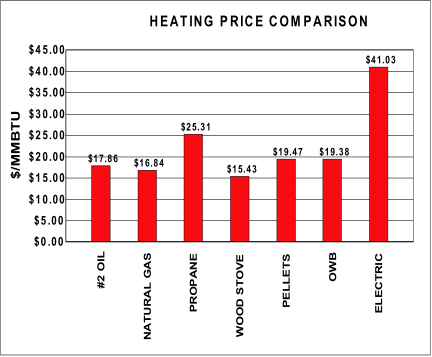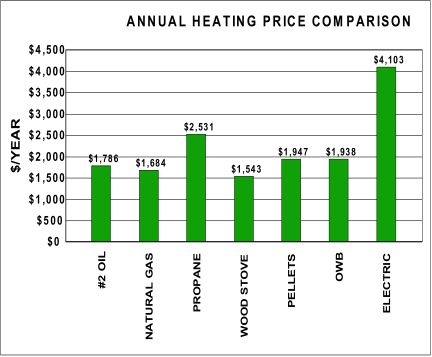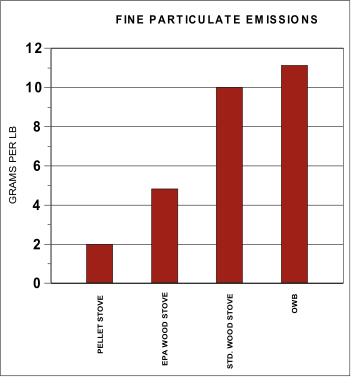| Economics Menu | |
|
|
150 Billion Dollar Problem |
|
|
Bay Area |
|
|
Pneumonia In An Employed Population |
|
|
Engineers Perspective |
|
|
Airimpacts.Org |
by Professor Curt M. Freedman, P.E., C.E.M.
There is a moral responsibility to use best available technologies to protect the environmental sustainability of the planet and the health and welfare of wildlife and humankind.
In a blind and misguided attempt to stay warm for less money, along with misplaced concerns for global warming, many people are mistakenly choosing to burn solid fuels such as cord wood, wood pellets, coal, or corn pellets. The alleged popularity and benefit of “biomass” or heating with wood and other solid fuels is simply not justified by the expense, detrimental health impacts of "second hand" wood smoke, fire hazards, and poor heating performance of solid fueled wood, coal or corn stoves. Newspapers and magazines as well as movies and television that promote the use of wood stoves and fireplaces as being romantic and natural do not responsibly present the detrimental health and safety ramifications of heating with solid fuels nor do they discuss more cost-effective alternatives that would promote improved energy efficiency, conservation, air quality, health and safety. The sales marketers are also telling us that we can save money by paying thousands of dollars on modified wood stoves or outdoor wood boilers that burn corn. Corn is being used today in everything from feeding livestock to the basic ingredients in cold cereal and bread. The increase in the demand for corn has nearly doubled its cost in the last two years. Based on data from the food and agriculture organization of the United Nations, 850 million people on our planet are malnourished; whatever concerns there may be for global warming, the need for corn to enter the food chain must take priority over burning it. Food should only be used for nutrition, not combustion.
Interest in energy cost reduction and conservation has increased recently due to the following developments:
a) Increase in natural gas prices caused by increased demand; the Wall Street Journal has reported that the increase in demand can be directly linked to the increased utilization of natural gas for electric power generation.
b) Increase in demand for oil and higher prices caused by the strong global economy;
c) Unrest in the Mid-East;
d) Concern for price volatility caused by low domestic oil supplies.
As a licensed professional engineer in the Commonwealth of Massachusetts and a college professor specializing in energy management and alternative energy, I have major concerns with wood heat. There is inadequate economic benefit to burn wood; a modern high efficiency oil, propane or natural gas appliance will provide excellent performance especially in comparison to electric heat. A modern conventional system also provides the opportunity for zoning and set-back temperature control to achieve both improved comfort and economy.
Solid Fuel Fine Particulate (PM 2.5) Emissions
Note: EPA Wood stoves have been documented to have pollution levels comparable to Standard Wood Stoves within two heating seasons.
Fine particulate emissions from OWBs can be higher because:
- The outdoor wood boilers are much less efficient; there is more incomplete combustion, especially when an OWB is in its idling (smoldering) mode. While an EPA woodstove will release 2.4 gm of PM 2.5 per lb of wood, an OWB can release 3-4 times the PM 2.5 per lb of wood burned.
The firing rate of an OWB is much higher. While an EPA wood stove has a maximum energy input rate of 15,000 Btu/hr (1 kg of wood/hr), an OWB can be 10-20+ times the firing rate of a EPA wood stove.
Some of the larger OWB can have more than double the firing rate (500,000 Btu/hr) of an average outdoor wood boiler and pollute even more.
The quality and type of wood placed in an OWB, such as wet wood or soft woods will produce far more smoke than seasoned hard wood.
Economic Comparison
A comparison of heating consumption and cost based on a home consuming 100 million BTU of energy per year (1 BTU will heat 1 lb of water 1ºF):
| Fuel | Unit Price | Efficiency | Consumption | Annual |
| #2 heating oil | $2.10/gallon | 84% | 850 gal | $1,788 |
| Natural Gas | $1.60/therm | 95% | 1,053 therms | $1,684 |
| Propane | $2.20/gallon | 95% | 1,1050 gal | $2,531 |
| Wood Stove | $200/cord | 54% | 7.7 Cords | $1,543 |
| Wood Pellets | $4.98/40 lb bag | 78% | 391 Bags | $1,947 |
| Outdoor Wood Boiler | $200/cord | 43% | 9.7 Cords | $1,938 |
| Electric | $0.14/kWh | 100% | 42,875 kWh | $4,103 |
Price Comparison per Million BTU:

Price Comparison Based on Annual Heating Consumption of 100 Million BTU:

When one adds the $2,000 to $20,000 initial equipment cost and the ongoing value of a person’s time to clean the equipment and load the fuel, an investment in a solid fueled wood or pellet stove or outdoor wood boiler may have no economic payback.
Health Impacts
There can be significant health impacts; a wood stove is 500-1,000 times dirtier than a modern natural gas, propane or oil appliance.
Wood smoke emissions contain fine particulate pollution as well as other carcinogens and can have similar detrimental health effects as tobacco smoke. Experts have documented that the chemical components in wood smoke cause irritation to the respiratory system resulting in bronchitis, asthma, and sinus infections weakening the immune system, and lower resistance to infectious diseases. I feel that it is time for more responsible energy policies to direct citizens in a more environmentally and economically smarter route on the highway of the 21st Century. I feel that the public should know that returning home in a gas guzzling SUV to their glass enclosed family room heated with a wood stove and a redwood Jacuzzi heated with wood from an 80 year old red oak tree may not be environmentally friendly. I feel that we need to utilize equipment that has comparable emission levels and protects clean air quality standards. I think we need to more aggressively promote energy & electrical conservation to reduce our emissions from, and consumption of fossil fuels. I do not feel burning formerly healthy hardwood trees is the proper utilization of our forests. The biomass reactionists have never explained how chopping down oxygen producing, CO2 consuming trees and burning them reduces global warming. BURNING WOOD IS NOT ENVIRONMENTALLY NEUTRAL.
My experience with fine particulate air pollution began several years ago when my neighbor installed an EPA approved wood stove (with a catalytic converter) that resulted in my normally healthy lungs bleeding from bronchitis and my son being hospitalized. I resolved the problem with my neighbor by investing in a natural gas hydronic heating system for their family room so they could choose to utilize a heating system that releases 1/1000th the PM1O and PM 2.5 pollution of a wood stove. After this experience, I became an advocate in my community identifying problems with the use of solid fuels and promoted Best Available Technologies or "BATs" utilizing conventional heating equipment.
In past years, I have presented documentation to the Longmeadow Board of Health, the Longmeadow Bertucci's Wood burning Pizza Restaurant converted its wood burning oven to natural gas. The emissions from the wood oven became a nuisance after the wood smoke continued to detrimentally impact the occupants of a nearby commercial office building, including the chairman of the Longmeadow Board of Health.
There are other very good reasons to utilize conventional fuels:
"Wood smoke is significantly associated with respiratory function decrements in young children with asthma." In the Seattle area, "60%-90% of particles in residential neighborhoods ... are from wood burning year round."-EPA report: "A Summary of The Emissions Characterization and Non-Cancer Respiratory Effects of Wood Smoke," 12/1993.
"Individuals can also help reduce particulate pollution through simple steps such as using energy efficient light bulbs and appliances, maintaining cars properly, insulating homes, and curtailing use of wood stoves for home heating in favor of cleaner fuels."-NRDC report: "Danger in the air," 1996.
One Outdoor Wood Boiler (OWB) emits as much fine particulate pollution as:
- 2 heavy-duty diesel trucks
- 12 EPA-certified indoor wood stoves
- 45 passenger cars
- 1,000 homes with oil heat
- 1,800 homes with natural gas heat
~New York State AG’s Environmental Protection Bureau, 2005.
Summary and recommendations:
1) Everyone must know the detrimental effects of secondhand wood smoke; solid fueled appliances should have warning labels as do cigarettes; we all have a right to know of substances that are unhealthful; people will make better fuel use choices if better informed.
2) In order to reduce Global Warming, we should all aggressively implement energy and electrical conservation to reduce fossil fuel emissions in our homes and in our vehicles. Example: additional zones and/or nighttime set-backs will save energy in our homes and reduced highway speeds would improve mileage on our vehicles. Take advantage of the tax credits from the Energy Policy Act of 2005:
New Windows or Storm Windows: $200
New Doors or Storm Doors: $200
Insulation: $500
High Efficiency Furnace/Boiler: $150
Solar Hot Water: $2,000
3) It is far better to convert from electric heating to conventional fuels instead of converting from electric to wood;
4) Re-establish the right of every citizen in this country to breath clean air and not be detrimentally impacted by fine particulate pollution; if we were putting creosote in our water supply there would be a public outcry;
5) Inform the public that during periods of fog or nighttime inversions atmospheric conditions may not allow sufficient atmospheric ventilation to justify using a wood stove or fireplace 24 hours a day. A conventional heating system must also be installed so that cleaner conventional fuels can be utilized when atmospheric conditions do not allow sufficient atmospheric ventilation or when the solid fuel appliance becomes a nuisance to abutters.
Substantial scientific evidence has shown that wood smoke can cause and/or contribute to: cardiopulmonary disease, asthma, bronchitis, emphysema and other problems such as eye irritation, sinus infections, and acid reflux.
Closing Comments:
~ Let us not sacrifice our health in an attempt to save money.
~ Fine Particulate Air Pollution Is Not a Small Problem!
~ Let us use best available technologies, truly clean technologies such as conservation, wind and solar to help save our planet.


